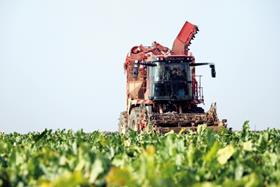
The government's decision to unveil its no-deal tariff strategy just two weeks prior to the expected Brexit date of 29 March has been slammed by food industry bodies.
This morning the government announced that 87 per cent of imports, including fruit and vegetables, would be allowed to come in tariff-free post Brexit in the event of a no deal. The zero tariffs would apply for up to one year while the approach is reviewed.
While welcoming a degree of clarity, trade bodies have lambasted the government for only revealing its strategy a fortnight before Brexit, and called on parliament to rule out any possibilty of no deal in tonight's [13 March] crucial vote.
Food & Drink Federation chief executive Ian Wright was particularly scathing, saying the tariff announcement shows why the UK is not ready to leave the EU on 29 March. 'Business cannot adapt to this new regime in just two weeks,' he said. 'It is disgraceful that we are, only now, getting to see these. There must be proper consultation with business before a change of this magnitude is introduced.
“We were promised that business would only have to adapt to one new change of rules; it’s now clear that promise has not been kept.'
Describing the new system as 'confusing and complex', Wright said the mixture of zero tariffs, new tariffs and quotas, with 'little logic to explain the difference' between which products have protection, and the promise of zero tariffs on goods crossing the Irish border, would result in 'massive trade distortions.'
“In a world where it is costly and complex to export finished goods to the EU, and costly and complex to import key ingredients, many food and drink manufacturers who trade with the EU will surely question whether the UK is the right place for them to be.'
NFU president Minette Batters added: 'While we are relieved that we are finally able to see the tariffs that will be applied on imported food in a ‘no-deal’ scenario, it is appalling that we only now have this opportunity to do so. Farmers and food businesses have no time to prepare for the implications, which will be exacerbated by the fact that we will face tariffs on our own exports on food into the EU and other countries with whom we currently enjoy free-trade arrangements.
“Although we are pleased to see that the government has listened to our concerns and elected to treat many agricultural sectors sensitively, which may support farmers who are already facing disastrous disruption from no-deal, it is enormously worrying that some sectors will not have this protection – noticeably eggs, cereals, fruit and vegetables.
“We recognise the importance of ensuring food prices for consumers do not rise in a no-deal Brexit but we are deeply concerned that the approach to tariffs published todaywill mean a greater reliance on food produced overseas. This would not necessarily lead to cheaper food for consumers but would mean we export and increase the environmental impact of our food production while losing control of the high standards of animal welfare to which that food is produced. In a no-deal scenario the government must act immediately to revise these tariffs and quotas should this happen.'



